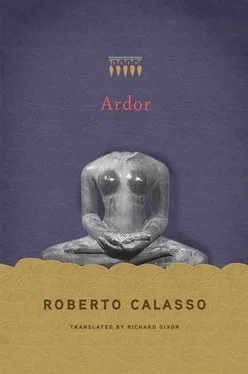73, 5
A. Berriedale Keith, The Religion and Philosophy of the Veda and Upanishads , Harvard University Press, Cambridge, 1925, vol. II, p. 442.
73, 31
Jaiminīya Brāhmaṇa , 1.357 (trans. Jan Gonda).
74, 11
Śatapatha Brāhmaṇa , 10.4.4.2.
74, 19
Ibid., 10.4.4.3.
74, 37
Ibid., 2.2.4.4.
75, 4
Ibid.
75, 14
Ibid., 2.2.4.6.
75, 17
Ibid.
75, 26
Ibid., 2.2.4.9.
77, 30
Ibid., 1.7.4.1–8.
78, 1
Ibid., 1.8.1.10.
78, 18
Ibid., 1.7.4.4.
78, 26
Ibid., 1.7.4.9.
79, 15
Ibid., 1.7.4.15.
79, 18
Ibid., 1.7.4.19.
80, 4
Charles Malamoud, “Tenir parole, retenir sa voix,” in L’inactuel 5, Autumn 2000, p. 223.
80, 14
Śatapatha Brāhmaṇa , 1.7.4.18.
80, 30
Ibid., 10.4.4.1.
81, 23
Ibid., 10.6.5.1.
81, 32
Ibid., 10.1.3.1.
82, 15
Jaiminīya Brāhmaṇa , 2.69.
82, 20
Śatapatha Brāhmaṇa , 10.4.3.3.
82, 23
Ibid., 10.4.3.4.
82, 28
Ibid., 10.4.3.6.
82, 32
Ibid., 10.4.3.20.
83, 3
Ibid., 10.4.3.9.
84, 3
Ibid., 10.5.2.3.
84, 7
Ibid.
84, 15
Ibid., 11.4.3.1–2.
86, 2
Ibid., 10.4.4.5, which cites Ṛgveda , 1.179.3.
86, 34
Ibid., 9.4.1.4.
87, 6
Ibid., 9.4.1.15.
87, 12
Ibid., 2.5.2.2.
87, 18
Ibid., 2.5.2.13.
88, 2
Ibid., 6.1.2.23.
88, 6
Ibid.
88, 24
Chāndogya Upaniṣad , 4.10.3.
88, 28
Ibid., 4.10.5 (trans. Émile Senart).
88, 31
Ibid. (trans. Émile Senart).
88, 36
Bṛhadāraṇyaka Upaniṣad , 5.1.1.
89, 2
Śatapatha Brāhmaṇa , 7.1.2.1.
89, 5
Ibid.
89, 30
Chāndogya Upaniṣad , 3.12.7–9 (trans. Émile Senart).
90, 8
Armand Minard, Trois Énigmes sur les Cent Chemins , Les Belles Lettres, Paris, 1949, vol. I, pp. 80–81.
90, 10
Śatapatha Brāhmaṇa , 10.3.4.3.
90, 13
Stella Kramrisch, “Pūṣan” (1961), in Exploring India’s Sacred Art , edited by B. Stoler Miller, University of Pennsylvania Press, Philadelphia, 1983, p. 171.
90, 17
Śatapatha Brāhmaṇa , 10.3.4.5.
90, 21
Ibid.
90, 25
Bṛhadāraṇyaka Upaniṣad , 1.1.1.
90, 35
Ibid., 1.2.1.
91, 1
Ibid., 1.2.2.
91, 6
Ibid., 1.2.4.
91, 12
Ibid., 1.2.6.
91, 16
Ibid., 1.2.7.
91, 19
Ibid.
91, 23
Ibid.
91, 31
Ibid.
91, 36
Śatapatha Brāhmaṇa , 10.1.3.1.
92, 2
Ibid., 10.4.2.2.
92, 2
Ibid.
92, 11
Ibid., 10.4.3.3.
92, 18
Ibid., 11.5.4.1.
92, 20
Ibid., 11.5.4.2.
92, 25
Ibid., 4.5.5.1; 4.5.6.1; 4.5.7.1.
93, 24
Ibid., 1.2.4.21.
93, 28
Ibid.
93, 35
Ibid., 4.6.1.4.
V. THEY WHO SAW THE HYMNS
97, 16
Hermann Oldenberg, Vorwissenschaftliche Wissenschaft , Vandenhoeck & Ruprecht, Göttingen, 1919, p. 54.
98, 6
Ibid.
98, 20
Ibid., p. 224.
98, 31
Louis Renou, La Poésie religieuse de l’Inde antique , P.U.F., Paris, 1942, p. 4.
98, 34
Ibid.
100, 15
The Poem of Erra , 162.
100, 16
Ṛgveda , 1.164.15.
100, 32
Śatapatha Brāhmaṇa , 2.1.2.4.
101, 31
Ibid., 1.4.3.6.
102, 5
Ibid., 3.4.4.27.
102, 36
Ṛgveda , 7.33.5.
103, 7
Ibid., 7.83.7.
103, 20
Devībhāgavata Purāṇa , 6.12.26.
103, 23
Taittirīya Saṃhitā , 3.5.2.1.
VI. THE ADVENTURES OF MIND AND SPEECH
107, 5
Vājasaneyi Saṃhitā , 34.1 (trans. Louis Renou).
107, 7
Ibid., 34.2.
107, 8
Ibid.
107, 9
Ibid., 34.4.
107, 10
Ibid., 34.6.
107, 12
Ibid., 34.1–6.
107, 18
Ibid., 34.6.
107, 26
Ṛgveda , 10.129.1.
107, 27
Śatapatha Brāhmaṇa , 10.5.3.1.
108, 3
Ibid., 10.5.3.2.
108, 31
Taittirīya Brāhmaṇa , 2.2.9.1.
109, 3
Ibid., 2.5.11.4.
109, 3
Śatapatha Brāhmaṇa , 4.1.1.22.
109, 35
Ibid., 1.4.4.2.
110, 10
Ibid., 1.4.4.9.
110, 12
Ibid.
110, 14
Ibid., 1.4.4.5.
110, 18
Ibid., 1.4.4.7.
111, 7
Ibid., 1.4.5.9–12.
111, 21
Iliad , II, 205; II, 319; IV, 59.
111, 37
Śatapatha Brāhmaṇa , 3.2.1.18.
112, 36
Ibid., 3.2.1.19–22.
113, 25
Ibid., 3.2.1.24.
113, 28
Ibid.
113, 34
Ibid., 3.2.1.26.
113, 37
Ibid., 3.2.1.27.
114, 11
Ibid., 3.2.1.28.
115, 29
Chāndogya Upaniṣad , 7.3.1.
116, 4
Ibid.
116, 8
Śatapatha Brāhmaṇa , 3.4.3.14.
116, 16
Ibid., 3.4.3.16.
116, 18
Ibid., 3.2.1.25.
116, 24
Ibid., 3.4.2.15.
116, 25
Ibid., 3.4.2.16.
VII. ĀTMAN
119, 8
Ṛgveda , 1.164.20.
120, 16
Śatapatha Brāhmaṇa , 12.3.4.11.
120, 21
Bṛhadāraṇyaka Upaniṣad , 1.4.1.
120, 35
Ibid., 1.4.5.
122, 31
Chāndogya Upaniṣad , 7.1.1.
122, 34
Ibid.
122, 37
Ibid., 7.1.2.
123, 8
Ibid.
123, 15
Ibid., 7.1.3.
123, 20
Ibid.
123, 24
Ibid., 7.2.1.
123, 32
Ibid.
124, 11
Ibid., 7.4.2.
124, 16
Ibid., 7.5.1.
124, 26
Ibid., 7.5.2.
124, 34
Ibid., 7.6.1.
125, 5
Ibid.
125, 9
Ibid., 7.7.1.
125, 16
Ibid., 7.8.1.
125, 27
Ibid., 7.15.4.
125, 33
Ibid., 7.16.1.
126, 3
Ibid., 7.22.1.
126, 6
Ibid., 7.1.3.
126, 10
Ibid., 7.23.1.
126, 12
Ibid., 7.25.1.
126, 18
Ibid.
126, 28
Ibid., 7.25.2.
126, 31
Ibid., 7.26.1.
126, 37
Ibid., 7.26.2.
127, 3
Ibid.
127, 22
Ibid., 7.23.1.
128, 6
Ibid., 7.25.2.
128, 15
Ibid., 7.1.1.
128, 19
Ibid., 6.1.2.
128, 27
Ibid., 6.2.1.
128, 29
Ibid., 6.2.3.
129, 2
Ibid., 6.4.5.
129, 5
Ibid., 6.8.7.
129, 13
Ṛgveda , 10.72.2.
129, 15
Taittirīya Upaniṣad , 2.7.1.
129, 17
Chāndogya Upaniṣad , 3.19.1.
129, 36
Ṛgveda , 10.129.1 (trans. Louis Renou).
129, 37
Ibid., 10.129.3.
130, 1
Ibid., 10.129.2.
130, 2
Ibid., 10.129.3.
130, 3
Ibid., 10.129.2.
130, 7
Ibid., 10.82.6.
130, 8
Ibid., 10.129.2.
130, 10
Ibid., 10.129.3.
130, 17
Louis Renou in Hymnes spéculatifs du Véda , edited by Louis Renou, Gallimard, Paris, 1956, p. 254.
130, 18
Karl Friedrich Geldner, Der Rig-Veda aus dem Sanskrit ins Deutsche Übersetzt , Harvard University Press, Cambridge, 1951, vol. III, p. 360.
130, 21
Ṛgveda , 10.27.4.
130, 30
Ibid., 10.129.4.
130, 38
Ibid.
131, 19
Ibid., 10.129.5.
131, 21
Ibid.
131, 23
Ibid.
131, 30
Ibid., 10.129.6.
131, 34
Ibid., 10.129.7.
132, 15
Śatapatha Brāhmaṇa , 11.2.2.6.
Читать дальше












